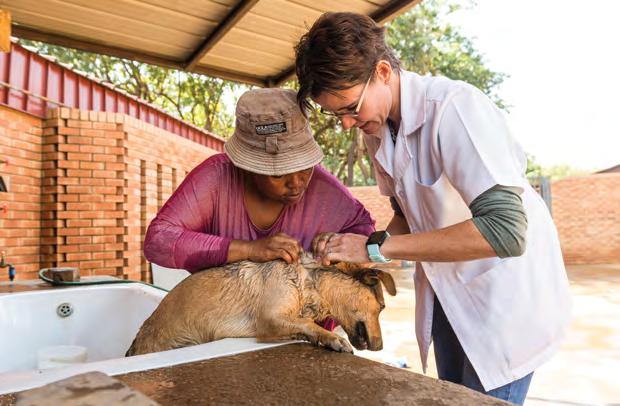
11 minute read
Engagement
4
Engagement
Contributing to the development and well-being of people and society is a critical element of UP’s public mission and permeates our engagement on local, national and international levels.
Community engagement and social responsibility is not a “bolt on” at UP, it is a core role and responsibility of being an anchor institution that makes a direct impact on the local economy and environment. In 2020, the University continued pursuing its priority initiatives, inter alia, to establish a more accessible, outwardfocused campus, within the constraints imposed by the pandemic.
OUR LOCAL COMMUNITY
The University has an extensive community engagement programme with approximately 30 000 students – around 45% of our student body – involved in various upliftment projects in 2020. Of these, 90% were undergraduates, working across 350 modules. Fewer than 10% of the community-based learning activities planned for 2020 (mainly excursions) had to be cancelled due to COVID-19.
In close collaboration with the Hatfield City Improvement District, we continued on a path to counteract creeping urban decay in Hatfield, the suburb that is home to the largest of our campuses.
Two of our engagement sites close to the Hatfield Campus are Reliable House and Moja-Gabedi, which were neglected sites that now have community vegetable gardens. MojaGabedi is also being used as a therapy garden providing occupational, wellness and art therapy. The two gardens are tended to by volunteers, vulnerable students who asked for their own garden and students doing community engagement. Churches and nursing homes, as well as homeless people, are also involved.
Stepping up to fight COVID-19
The coronavirus pandemic provided our students and staff with numerous opportunities to help others. Significant student projects included:
• Hotline help: Final-year medical students volunteered to staff a hotline for people who had questions about the virus. The University partnered with Sediba Hope
Medical Centre and the City of Tshwane. • Online assistance: Students helped teachers from
Tsako Thabo Secondary School in Mamelodi, Blue Hills
College in Midrand, Laerskool Menlopark and Pretoria
Secondary School to implement their online teaching programmes. Students in the Faculty of EBIT used their skills to update mark sheets, create databases and online forms. They also helped teachers to solve problems such as pupils not knowing how to upload their school assignments. • Hand sanitiser: Students and staff in the Department of Chemical Engineering produced a hand sanitiser, which was donated to paediatricians at Steve Biko
Academic Hospital.
• Helping the homeless: Students developed a mobile app to help Tshwane homeless shelters, which had been inundated with requests regarding the pandemic.
Our researchers and partners are also taking part in the multidisciplinary UP project, Pathways Out of Homelessness. As homelessness is one of the challenges of our time, there is a need for engaged research in Pretoria’s inner city suburbs. The research is designed to improve policy, budget and practices in dealing with the growing problem of homelessness. improving hearing through UP’s innovative 3D-printed middle ear transplants, to addiction treatment, sustainable agriculture and affordable nutrition.
Hubs of engagement
At the Viva Village in Mamelodi’s Alaska township, all faculties are involved in a multi- and transdisciplinary community engagement hub. We work together with community healthcare workers and clinics to provide a holistic service.
We do the same in Zama-Zama and Plastic View squatter camps, and in the pop-up clinic of Salvokop to identify and address common health issues. This ranges from Our veterinary students are engaged in rural vaccination stations.
In terms of education, we have several high school programmes in disadvantaged communities. The JuniorTukkie programme, for example, strengthens engagement with schools serving marginalised communities, and there is also a JuniorTukkie App.
UP occupational therapy students engage with parents and toddlers on the importance of play in children’s development.
Our students also contribute through the Tuks Leadership and Individual Programme (TULIP). This is a student-run, non-profit that assists promising learners from four under-resourced Pretoria schools to access a tertiary institution.
NATIONAL ENGAGEMENT
The Convocation Advisory Board was established in 2020 after the election of 12 Convocation members to the Board. The Advisory Board acts as an advisory body to the University and the Vice-Chancellor and Principal. One of its aims is to ensure that all alumni and convocation members work together to build a dynamic alumni community and support the University in its fundraising efforts.
Notable partnerships with the private sector helping us to address pandemic-related needs included:
• Aspen Pharmacare donated 600 tablet devices, valued at R2.4 million, to enable online learning by economically challenged students during COVID-19.
Isuzu and Rand Merchant Bank supplied 15 vehicles to the University’s Faculty of Health Sciences to be used in the fight against COVID-19.
The African Commission on Human and People’s Rights appointed Faculty of Law Professor Christof Heyns, and colleagues to assist with a continent-wide comparative study on the use of force by law enforcement officers. Prof Heyns also led a two-year process to adopt comprehensive standards on how states should deal with peaceful assemblies. These guidelines were adopted by the United Nations Human Rights Committee and are binding for the 173 states in the world that have ratified
the Covenant on Civil and Political Rights.
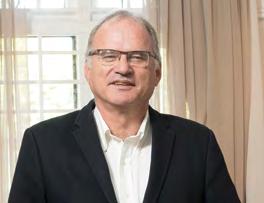
Prof Christof Heyns, who sadly passed away in 2021. Advocate Karabo Ozah, Director of the Centre for Child Law, was appointed by the Minister of Justice and Correctional Services to serve on the Advisory Committee of the South African Law Reform Commission’s Project 100D: Family Dispute Resolution – Care of and Contact with Children. This committee investigates and recommends how the family justice system can better look after the needs of children and families.
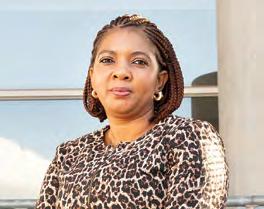
Partnerships with industry and government
The University has a track record of successful collaboration with industry, including placement opportunities for our students, infrastructure development and continuing professional development. UP’s strong partnerships are also reflected in the number of Research Chairs at UP funded by industry, a few of which include:
• York Timbers entered into a strategic partnership with UP to establish a transdisciplinary research chair focused on the genetics, structural engineering and design of advanced wood products (engineered wood) in the context of a sustainable built environment and the wood-based bioeconomy in South Africa. York
Timbers will provide funding of R23 million for the chair over the next five years (2021–2025). • The Murray & Roberts Chair in Industry Leadership 4.0 was launched in January 2020 in the Department of Mining Engineering. This research chair will provide specialised skills and capacity building to
help implement optimised systems linked to 4IR, particularly in relation to the mining and mineralsrelated industries. Murray & Roberts has committed its support of this new chair for the next three years. • Rand Water, which already funds four research chairs at UP, awarded the University an additional chair in
Electrical Engineering. The chair, launched in January 2021 in the Department of Electrical, Electronic and
Computer Engineering, aims to develop a research niche relevant to the South African water supply sector.
The collaboration uses industry 4.0 technologies that will assist Rand Water. • The University renewed an agreement with the Hans
Merensky Foundation for the Hans Merensky Chair in
Avocado Research, led by Prof Noëlani van den Berg.
One of the programme’s many accomplishments is its role in the establishment of the International Avocado
Genome Consortium.
UP is partnering with industry bodies and government ministries along with various universities and research institutes in the Grain Research Programme. This initiative started in 2018 with the signing of Memoranda of Understanding between UP, Grain SA and the South African National Seed Organisation (SANSOR) and launched in August 2020.
In 2020 the University entered into a partnership with Advance.io to develop an information hub, a cloud-based national scientific repository with associated tools and models to support the digitalisation of the agriculture and forestry industry. The University’s Centre for Entrepreneurship launched a free National Support Portal to assist small, medium and micro-enterprises during the turbulent pandemic period and beyond. More than 320 professionals offer services free of charge and businesses can access resources such as a chatroom, professional counselling, digital marketing, technical and communication assistance.
GLOBAL PARTNERS
Global cooperation and collaboration are a strategic focus for UP and we collaborate with more than 3 000 institutions around the world. This encourages an
The winners of the Community Engagement Group Award were Prof Jannie Hugo and Dr Amanda Talma from the Department of Family Medicine in the Faculty of Health Sciences.
Dr Amanda Talma Prof Jannie Hugo
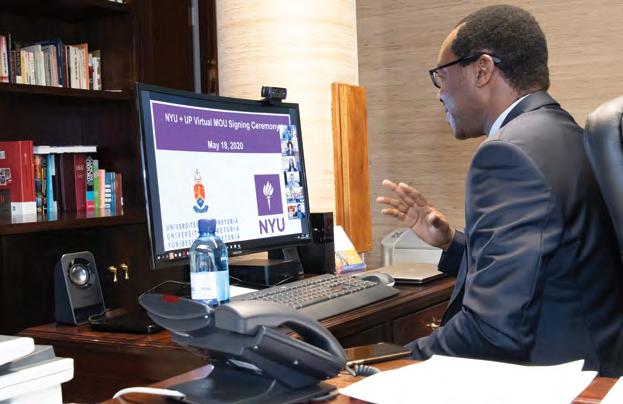
Prof Tawana Kupe at the virtual signing of an MoU between UP and NYU. The two institutions will cooperate in the areas of transformational leadership, faculty exchange, renewal and transformation of curricula and student leadership capacity development.
international perspective while also exposing students and researchers to a wider pool of expertise and resources.
Currently, UP is the only African university on the global University Social Responsiveness Network (USRN) – an international group of the top 15 universities in the world in this field. UP is also represented on the Talloires Network, another international association of universities committed to strengthening the civic roles and social responsibilities of higher education.
In 2020, the University approved the UP Africa Global University Project (AGUP), a strategic and transformative initiative to revitalise the University’s collective partnerships approach. It focuses on building an institution that is internationally recognised for research excellence and high-quality engaged scholarship, while contributing to social and economic development in South Africa, Africa and globally. Newly formalised partnerships include: a Memorandum of Understanding (MoU) with Murdoch University in Australia; with New York University (NYU) through an institutional agreement to cooperate in several areas; and serving on the board of the Southern African-Nordic Centre, initiated in 2019.
The University is part of a consortium, the Atlantic ECOsystems Assessment, Forecasting and Sustainability (AtlantECO) initiative. This has been awarded €11 million (about R216 million) to study the microbiomes in the South Atlantic Ocean.
UP is the principal coordinator of the medical capacitybuilding project Dirisana, in partnership with Sefako Makgatho Health Sciences University, the University of the Witwatersrand, the University of Namibia and Welwitchia University in Namibia. The European Union has awarded the partnerships a grant valued at £1 million (about R23 million) to set up Dirisana.
Under the auspices of the African Research Universities Alliance Centre of Excellence in Sustainable Food Systems, UP is leading the Food Systems Research Network for Africa, a collaborative initiative between UP, the University of Leeds and the Food, Agriculture and Natural Resources Policy Analysis Network.
UP is collaborating with the United Nations International Children’s Fund and the United Nations Development Programme to develop and implement plans to address developmental challenges of young people in South Africa.
International alumni
UP has around 270 000 alumni in 118
countries. Most live in South Africa, and of these approximately 55% live in Gauteng. Outside Africa, our biggest international presence is in the UK, Australia and the US. In 2020 UP became the first university in Africa to launch its alumni events on LinkedIn Live.
The LeadUP Online Alumni Events are a series of virtual topical debates and masterclasses hosted on UP’s LinkedIn page to create a space for dialogue and engagement. One of the highlights of the events was a conversation that involved the Ministers of Justice in South Africa and Namibia, Minister Ronald Lamola and Minister Yvonne Dausab (who are also UP alumni), as well as Prof Elsabe Schoeman, Dean of the Faculty of Law.
270 000
Alumni in 118 Countries
UP joined the Austria-Africa University Network in 2020, a network which has a membership of 63 African universities and 19 Austrian universities, and a number of further collaborations between UP and African institutions are in place.
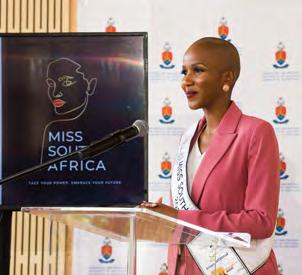
UP alumna, Shudufhadzo Musida, was crowned as Miss South Africa, 2020.
Prof Sonali Das, from the Department of Business Management in the Faculty of Economic and Management Sciences, was elected to the prestigious International Statistical Institute.
Prof Don Cowan, Director of the Centre for Microbial Ecology and Genomics, is part of a team of international scientists awarded AU$36 million (R429 million) to conduct research in Antarctica to protect its future. The Australian Government provided the money to a Monash University-led research programme, Securing Antarctica’s Environmental Future. UP is the only South African university involved out of 30 international institutions. Prof Dire Tladi was appointed to serve on the commission on pandemics and international law of the Institut de Droit International. Prof Tladi joined an elite team of well-known international lawyers, such as former President of the International Criminal Tribunal, Theodore Meron, as well as Judge of the International Court of Justice, Xue Hanqin. Prof Tladi had earlier been appointed to the UN International Law Commission.
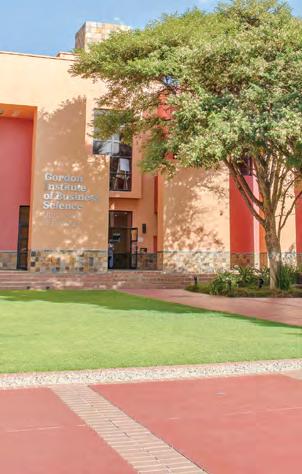
The Gordon Institute of Business Science (GIBS) continued with a wide range of African partnership activities during 2020. GIBS signed new MoUs with Kwame Nkrumah University of Science and Technology, Lagos Business School, China European International Business School – Ghana, and Zhejiang University International Business School to strengthen the school’s impact across Africa. In addition, GIBS offered a number of programmes for African institutions.







